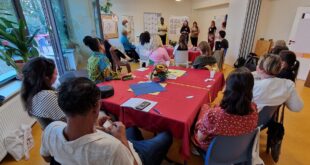Dozens of families of Moroccan migrants detained in Libya protested in Rabat on Monday, November 27, calling on Moroccan authorities to help their relatives return home as soon as possible. Sana Elouazi reports from Rabat
Gathered in front of the Ministry of Foreign Affairs headquarter in Rabat, the demonstrators, who came from several Moroccan cities, lambasted the “slowness” of authorities, demanding the release of their loved ones.
Authorities say that the delay in repatriating the migrants stems from security concerns. “Technical and logistical problems hinder the identification of Moroccans detained in Libya. Moroccan authorities also fear infiltration of jihadists and radicals on Moroccan territory,” a government source said.
One protester, Abderrahim Ouzim, told the news outlet Telquel Arabi that his brother left Morocco in early September, passing through Algeria to join Libya in order to cross the Mediterranean to Italy. He also expressed his hope for a royal intervention to put an end to the miserable detention and mistreatment of his brother.
A large group of Moroccans are currently stranded in Libya after their attempts to cross the Mediterranean to Europe failed. They found themselves the subject of human trafficking by smugglers before being detained by Libyan forces in Tripoli and the center of Zouara near the Tunisian border.
In several videos, the migrants have called for help from the Moroccan government and King Mohammed VI to bring them back home as soon as possible.
In response to the video, Moroccan authorities vowed to repatriate the large group of Moroccan migrants and recalled a previous repatriation operation, “which resulted in the return of about 200 citizens before Eid Al Adha [a sacrifice feast] through allocating two private aircraft deployed by the ministry for this purpose.”
King Mohammed VI also gave instructions to the Ministry of Foreign Affairs and the Ministry of Moroccans living abroad to monitor the situation of Moroccans detained in Libya.
© Morocco World News
 THE AFRICAN COURIER. Reporting Africa and its Diaspora! The African Courier is an international magazine published in Germany to report on Africa and the Diaspora African experience. The first issue of the bimonthly magazine appeared on the newsstands on 15 February 1998. The African Courier is a communication forum for European-African political, economic and cultural exchanges, and a voice for Africa in Europe.
THE AFRICAN COURIER. Reporting Africa and its Diaspora! The African Courier is an international magazine published in Germany to report on Africa and the Diaspora African experience. The first issue of the bimonthly magazine appeared on the newsstands on 15 February 1998. The African Courier is a communication forum for European-African political, economic and cultural exchanges, and a voice for Africa in Europe.




























